
A Soundtrack to Fear: The Inviting Dread of Mother of Sighs

I normally decry purpose-driven genre labels: for example, describing Bolt Thrower as ‘war metal’ just feels wrong, and normally it’s best to group bands together by what they sound like, not what they achieve or evoke. But in some cases, our musical lexicon is lacking: Mother of Sighs, a husband-wife duo out of Baltimore, Maryland, is technically an electronic ambient/noise/drone project, but those words together mean practically nothing beyond that there’s probably a synthesizer involved (there is). So, I suggest calling their debut self-titled EP what it is: horror music. It’s a genuinely unsettling soundtrack to the internalized terrors of life, and the poignant soundscapes acquire frightening potency when catalyzed by the imagination.
…
…
Constructed from uncannily mournful synthesizers, improvised instruments, the occasional drum machine, and vocals bound to raise goosebumps, Mother of Sighs is haunting but still somehow comforting: it omits jump scares, and the full-bodied synth tones swell into a surrounding embrace as they’re run through delay and reverb effects. This wasn’t achieved by random chance or luck—consisting of Terence Hannum (of experimental project Locrian) and his wife Erica Burgner-Hannum (who plays with Terence in The Holy Circle), Mother of Sighs comes from a background of knob-fiddling and sound-tweaking expertise. It pays off here: much of the EP feels like sinking into a warm, enveloping blanket that’s paradoxically suspenseful.
Each track that features vocals delivers them entirely differently, providing a targeted mood or atmosphere instead of a consistent sound. On “Black Bile,” the weirdly-echoing vocal passages are like ghosts, not speaking directly to the listener but instead indecipherably replaying moments recalled from their waking life. On “Anxia Corda,” improvising based off of an anti-panic exercise, Erica lists off a string of objects, calmly and at a measured tempo. Somewhat obscured by the heartbeat-like rhythm (the title translates to ‘anxious hearts’ in Latin) of the track, this repetitive chant is more discomfiting than any scream could be. “Ourself Behind Ourself” might be the most normal in delivery, as Erica sings clearly recognizable lyrics, but they remain heavily open to interpretation:
And there are days, many times you tried to leave me
But I’m always there, your eternal companion.
It’s not an album where the listener is meant to understand everything, certainly, and part of that is because it’s rooted in reality. Sonically, Mother of Sighs draws inspiration from horror soundtracks and revels in the luxuriously cryptic textures it creates, but the project is also an outlet for processing struggles and suffering. Erica’s essay that accompanies the release on Bandcamp outlines some of what’s expressed within the EP, but it would be impossible to fully convey it through text alone. As Erica mentions in the interview you can read below, this record is special in that it’s vulnerable—it’s absolutely not easy to talk about these topics, and making music inspired by them (and horror-movie-soundtrack-ready music, no less) is a step beyond that.
To learn more about the album, I reached out to Terence and Erica—read the interview below.
…

…
Mother of Sighs is a husband-and-wife duo, but you both also have other projects (Locrian, The Holy Circle). Is this the first time you’ve made music together?
Erica: I joined Terence’s solo act Unlucky Atlas when we were dating in 2000 which eventually became a four piece. I contributed vocals (Terence’s lyrics) to a few Locrian tracks over the years. We actually began The Holy Circle as a duo. Nathan Jurgenson joined on drums after hearing some demos that we recorded at home and Rob Savillo joined us three years ago. Mother of Sighs is an extension of ideas we’ve had for a while that didn’t really fit with our other projects.
Terence: Definitely not the first time. We’ve been playing music together for like 20 years from Unlucky Atlas to now with The Holy Circle. It’s definitely been a defining element of our relationship. But the tracks didn’t feel like what I would bring to Locrian or Axebreaker, so Mother of Sighs kind of emerged as something new and with the pandemic it just became this project we kept returning to.
The sound on this album is rich and emotionally weighted, often unsettling as well, due to the layered synthesizers, ambient textures, and often ghostly vocals. How did you settle on a sound for the album, and did you use any unusual gear to create it?
Erica: For vocals, I used a screen over Audio-Technica condenser mic and my TC Helicon duplicator and mic mechanic to add some thickness and layer at times but a more raw vocal sound was desirable for a lot of these tracks. There was also a lot of room noise in our basement studio that we didn’t really try to remove because it contributed to the vulnerability that I wanted to come through.
Terence: Well I honestly kind of thought of just general moods of horror scores. So I focused on using quite a few analog synthesizers plus organs, scraped metal, etc. I just wanted to create a tense atmosphere. I used a few synths to generate some thick atonal passages. It was really thinking of how do you make this soundtrack that isn’t a soundtrack, laying groundwork for something that could be a song. I bowed an old cymbal with this metal bar, and it had some unique effects as well.
Given that your debut is sonically inspired by horror soundtracks, what are some horror soundtracks that either served as inspiration or are just your personal favorites?
Erica: Halloween is a sentimental favorite. This is a tough question because there are so many but the stark, minimalist compositions of Mark Korven or Colin Stetson’s work on
Terence: I DJ a radio show every Halloween full of horror soundtracks called DEAD AIR here in Baltimore, so I am a massive fan. But I specifically went for a few this time like Gene Moore’s organ soundtrack for Carnival of Souls, to Wayne Bell and Tobe Hooper’s soundtrack for Texas Chainsaw Massacre which incorporated a lot of scraped metal on wood and almost like foley sound. I also really like things like Don Peake’s original score for The Hills Have Eyes to Carpenter and Howarth’s work on Halloween II or The Fog. These all kind of went in the hopper I guess, tension and release. I was kind of envisioning the psychological dread of Repulsion or Possession both with great scores too and kind of a claustrophobic feel combined with classic giallos. I mean my favorites are always changing from the late Francois-Eude Chanfrault’s score for Inside, Popol Vuh’s Nosferatu, to Fabio Frizzi’s soundtrack for The Beyond.
Have you done any soundtrack work for films in the past? If you could score a soundtrack for any horror film, what sort of film would you want to work with?
Erica: I haven’t. Mother of Sighs came about because Terence and I have always wanted to collaborate on a soundtrack. I went to school for theatre so soundtrack work feels like a natural extension of those aspects of myself. I would be interested an any well-written script but one that addresses reproduction, mental health, climate change, fascism would definitely peak my interest. Those are the subjects that keep me awake at night.
Terence: Yes, André and I from Locrian did a soundtrack for a documentary called “Adversary” and it was a lot of fun, we kind of made a horror score for a political documentary. I am always interested in scores for horror films but I think you can always bring something to a project whatever the genre. I am always open to working with filmmakers but of course my heart is in horror films forever – they’re how I got into synthesizers.
The conceptual and lyrical inspiration for the album is detailed on your Bandcamp page, where Erica’s written a personal essay about the psychological themes and experiences that go into the record. Was Mother of Sighs intentionally created to address these themes? How were the songs on the record composed?
Erica: Terence had already started writing some of the music but not all of the songs had been written yet. I had this really powerful idea that I kept coming back to about my experiences as someone trying to parent while struggling with depression and anxiety. It was terrifying to think of being so vulnerable but I couldn’t shake the idea so I really feel like the music told me what it would be. We knew we wanted to write something scary and battling depression and panic attacks has been more terrifying than any fiction I could have created. I was able to visualize these scenes which helped me stay present as I was recording vocals. It is often a chicken-or-the-egg situation when Terence and I write where we don’t know how we went about completing the song but it usually starts with Terence playing a riff. Once the idea is there, we’re both playing keyboards, I’m trying vocal ideas, and we’re sharing ideas back and forth.
Terence: The content is all Erica’s. We tend to start with a mood and a few synths, some minimal drum machine lines or rhythmic loop just to set a pulse and then we start adding and taking away. Once it gets to a spot where the idea of the song is there Erica kind of holes up with the track for a bit and composes lyrics and melodies/harmonies. Or we revisit it with other ideas; I did some screaming vocals on one track, and one is all instrumental. So it was very open ended. We just tried to make it interesting, even Erica’s vocals from sung to almost spoken word begin as ideas or textures – things we can take away or double. A lot happens in the mixing process where I take her voice or instrument phrases and reverse them and layer them.
On “Anxia Corda,” the lyrics are a list of nouns: “the book, the keys, … the floor, the clock” and so on. Is there a connection between the things listed?
Erica: The lyrics were improvised. It’s actually an exercise that a therapist taught me to feel more grounded when on the verge of panic. My panic attacks begin with a feeling of being overwhelmed by the sounds in my environment or by feeling physically closed in. If I can recognize it in time, it is helpful to acknowledge what I see, hear, taste, touch, smell and I continue until calm again. The song lyrics are unsettling out of context but more disturbing as the grounding exercise seems to turn to something obsessive, defeating the intention.
What’s next for Mother of Sighs? Is this a project that you see performing live?
Terence: It’s just such a strange time to make music in the pandemic world – we’re very fortunate since we live together and can go to our studio and work and create. However, just when you feel like maybe things are better you see a friend’s band having to cut a tour short or venue close over cases. So live is so up in the air, plus this is a tough project to pull off live but could also open a lot of avenues for a more theatrical or cinematic approach. However I definitely have ideas percolating about the follow up to this EP.
Erica: We’ve discussed ideas. I’m not sure I’m mentally or emotionally up to a lot of performances. Maybe a select show or two. The material makes it tough for me but I’m also open to the idea of live performance. I’m not sure what our next move is. If I’m concerned about my own self preservation, we should probably soundtrack a comedy.
…
Mother of Sighs released August 6th via Deathbomb Arc—a new, very limited, cassette run by Anathemata Editions is out now.










